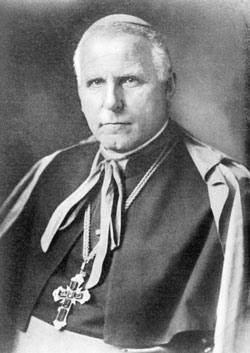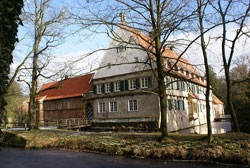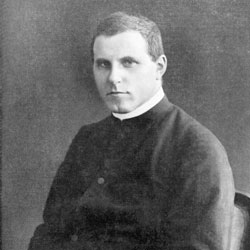Cardinal Von Galen
a Bishop after God’s Heart

BEHIND St. Gertrude and St. Peter Canisius, Blessed Mary of the Divine Heart and St. Theresia Benedicta of the Cross, Cardinal von Galen ranks among the figureheads of Catholicism in Germany. His beatification by our Holy Father Benedict XVI last 9 October enters into a plan of grace and mercy of the Holy Hearts of Jesus and Mary, whose ardent desire is to see this nation return to the bosom of the Roman Church. Did not Our Lord say to Sister Lucy of Fatima in 1940: « She will come back to My fold, but this moment is still a long way off. It is approaching; it is true, but slowly, very slowly. The Hearts of Jesus and Mary will reign there in splendour. » May Blessed Clemens August von Galen who so loved his country intercede with the Immaculate Heart of Mary to hasten this happy return!
In his study on Mother Mary of the Divine Heart, our Father had begun to unveil to us the heroic fidelity of German Catholics in the nineteenth century (CCR from no 315 to no 320, from January to June 1999). Let us take up these analyses in order to understand what was the holy life of Cardinal von Galen, the first cousin of our beata.
A CHILDHOOD PREDESTINED FOR COMBAT
On this 16 March 1878 at the height of the religious persecution decreed by Bismark, a great joy filled the sumptuous propriety of Dinklage in Westphalia: the birth of a boy named Clemens August in memory of his great-great-uncle, Mgr Clemens August Droste zu Vischering, Archbishop of Cologne. The archbishop clashed with the Prussian government, which sent him into exile for eighteen months. The courageous prelate thus inaugurated the German Catholics’ era of triumphant resistance.

The eleventh of thirteen children, Clemens-August was baptised on 19 March, the feast of St. Joseph. His father, Graf Ferdinand von Galen, and his wife, Gräfin Elizabeth von Spee, belonged to the old Westphalian noblilty. In the seventeenth century, the nobles of this region gave to the diocese and principality of Munster the famous prince-bishop Christoph Bernhard von Galen, Louis XIV’s ally against the Dutch.
A nephew of Mgr von Kettler, the bishop of Mainz and a deputy of the Zentrum, Graf Ferdinand had two brothers who were priests and a third one who was the auxiliary bishop of Munster; it was with the latter that the young Clemens August started out in the priesthood. His sister, Helen, married Graf Droste zu Vischering, the father of Blessed Mary of the Divine Heart. The two families were deeply united.
It was in this very Catholic atmosphere that Clemens August passed his childhood, surrounded with all the blessings of the Church. Besides the daily recitation of the family Rosary, the day began with Mass, which Clemens and Franz, his younger brother, served and which all the children were obliged to attend, on pain of being deprived of a meal until noon.
Fed on the heavenly Bread, the Graf resumed his functions as a Catholic deputy in the service of the Zentrum (cf. insert, below), while the Gräfin, who was profoundly pious and cultivated, devoted herself to the education of her children. Clemens August conserved throughout his life a boundless veneration for his parents, whose piety and zeal to fight and suffer for the Church imprinted itself in the inmost depths of his heart: « Their life was devoted to following Christ faithfully, just as during processions of the Blessed Sacrament where, indifferent to heat, dust and fatigue, they followed our Divine Saviour from station to station taking their children along with them. More than with words, they taught us by example that the only duty of our life is to follow Our Lord and Him alone, since He is our joy and our honour. In order to follow Jesus Christ crucified, they showed us that there is no other road than self-renunciation and carrying one’s cross. » (Memoirs of their daughter Paula)
THE ZENTRUM UNDER BLESSED PIUS IX
« God’s Church, the sacred Spouse of Our Lord, must be free in Prussia. The years of Kulturkampf that we have suffered were years of glory; for, since the Reformation, never has the vitality and the power of the Church been as they are today, a fact recognised by our enemies themselves… » (Windthorst)
Since 1860 German Catholics formed a party, the Zentrum, led by Windthorst, Savigny and Mallinckrodt. They had a hundred deputies in the Reichstag at Berlin, and were firmly established in the Rhineland. They wanted German unity to take shape around Austria. The men of the Zentrum defended three principles: the legitimacy of the princes who were despoiled by Prussia, the sovereignty of the Principalities and their Catholic Faith.
They clashed with Chancellor Bismarck, the main agent of Freemasonry, who accused them of being « enemies of the Empire and allies of France ». He wanted to unify Germany and have a national Church. In his fight against Rome, he went as far as to plan the dismemberment of France so that she would no longer be able to support the papacy.
Windthorst (17 January 1812 – 14 March 1891) was born at Kaldendorf in Westphalia. His piety inclined him towards the priesthood, but Providence led him to study law and become a lawyer. Armed with the support of Pius IX, he defended the interests of the Church with an apostle’s soul and a heart of fire. His interventions in the Chamber of Deputies put an obstacle in the way of Bismarck’s schism.
« The papacy like the Church of Christ is built on divine foundations… and all the efforts of impiety to destroy it will be useless… Oh! Gentlemen, the Pope whose death you have so often announced, yet lives and will live, and despite your opposition, the truth will be proclaimed to the world. »
« It is a terrible duel in which we are engaged. It is the combat of the Faith against unbelief; in fact, our choices are revolt against God or submission to the Cross. Now, do not forget, Gentlemen, this Cross is the symbol of victory; since we fight for its defence, our triumph is assured.
« What becomes of liberty when the liberals come to power? We have learned what at our expense. It is also what we see every day in France, where the Church is oppressed on all sides, violence is exerted and liberty is only recognised for one’s own coterie (…).
« With your schools from which religion is banished, all improvement in the social domain is necessarily impossible. Society can only be saved if religion is at the basis of education. »
(Life of Ludwig von Windthorst – G. Bazin)
Clemens August made his First Communion on 27 April 1890, then, accompanied by his brother Franz, he left his dear family in order to begin his studies at Stella Matutina College in Feldkirch, Austria, where the German Jesuits had been exiled. On the day of his arrival, the college was celebrating the closing of the month of Mary. This grandiose ceremony filled his heart with love for his Heavenly Mother and he did not delay in entering the Congregation of the Children of Mary. He wore her medal around his neck until his death.
From then on an important correspondence was established between the Gräfin and her son. Political and religious considerations concerning the Zentrum’s combat are interspersed with encouragements to work well and to reform his character. These are magnificent letters from this exemplary and profoundly Christian mother! Clemens August progressed so rapidly that four years later he left the college with brilliant results. He felt called to give himself to God.
In 1896, having obtained their high school diploma, the two brothers were sent to Freiburg in Switzerland in order to enhance their learning. Clemens August opened his heart concerning his vocation to Fr. Schäffer and, on his advice, registered in 1898 in the Jesuit minor seminary in Innsbruck (Austria), not without an interior struggle, for he was greatly attached to his paternal home. There, our young seminarian discovered with wonder the history of the Church, the beauties of the liturgy and the riches of theological teaching.
Fr. Hoffman, the superior, who had the reputation of a saint, taught his seminarians that devotion to the Sacred Heart was « the source and the richness of all priestly graces. » Let us recall that one year earlier, at the request of Our Lord to Mother Mary of the Divine Heart, Leo XIII consecrated the world to the Sacred Heart. Clemens August drew from this devotion all his intimacy with the divine Master.
His love for the Church became more ardent as he learned of the harassment that the government exerted on the clergy: « Ah! if I were also given the grace like St. Catherine to defend our Faith before the emperor and the erudite! » Unfortunately he could no longer rely on the support of the Zentrum that was no longer opposed to Wilhelm II’s politics, as our Father explained. (cf. insert, below)
THE ZENTRUM UNDER LEO XIII AND PIUS XI
« It is necessary to render the Zentrum inoffensive, for, as long as the Zentrum exists, we will not make it bend if it has the majority and, if it has a minority, we will not intimidate it. We must therefore get rid of the Zentrum and, above all, of the malicious guelph Windthorst. » (Bismarck)
After the death of Pius IX, Bismarck turned towards Leo XIII to overcome the resistance that he encountered in Reichstag. He obtained from the Pope the promise that the Zentrum would renounce its political demands in order to henceforth defend only its Faith. Consequently, our Father explained that, « thirty or forty years after the death of Windthorst, not only was the cause of the States and the provinces of the south, west and north methodically neglected, not only did good Catholic chancellors like Brüning become ingratiating sycophants of the Reichswehr, but this also took place: the religious cause was lost at the very moment when von Papen, the president of the Zentrum became Reichschancellor. For, he rushed to place himself at Hitler’s service to the point of wanting the Catholic Faith to yield to Berlin’s “secular” and Protestant demands. Where the legitimist, regionalist and Catholic Windthorst stood up to Bismarck, his successor was only able to capitulate before Hitler. »
« You believe that you will be stronger when you will be only Catholic? But you do not realise that Catholics, respectful of your princes and attached to your century-old independence formed an absolutely unbreakable block! While you no longer debate anything but anti-Catholic laws, you will let yourself be absorbed and weakened in all the rest. We in France have done likewise, and at the same moment, but under other influences… » (Conference of 12 May 1996)
1904 – 1933: A DISCIPLE OF SAINT PIUS X
Clemens August was ordained a priest on 28 May 1904, at Munster, and was named curate of the cathedral, with his uncle Mgr von Galen. He assisted him in his rounds conferring Confirmation and, for the fiftieth anniversary of the proclamation of the dogma of the Immaculate Conception, accompanied him to Rome. The happiness of attending magnificent ceremonies was coupled with the joy of a private audience with the Pope: « How can I describe the impression that Pius X made on me! He is very, very different from Leo XIII. Goodness and kindness but also grave serenity can be read on the features of his noble visage. We are far from seeing in him a sovereign like Leo XIII; in fact, his goodness does not give us this impression of condescension… The audience lasted ten minutes, and I was obliged to content myself with that. » (Letter to his Mother, 25 November 1904)
Shortly after his return from Rome, he learned of the death of his father, Graf von Galen: « Dear little mother, how consoling it is to know that our dear father is there where, throughout his life he prepared himself to go and to lead us. Deo gratias for everything! » (31 January 1906)

in Berlin in 1911.
Clemens August was appointed curate in Berlin, a city that could not be more Protestant and industrialised, a city that Mother Mary of the Divine Heart described as detestable. This ministry in a Godless world would cause him great moral suffering. His new parish, St. Matthias, numbered thirty thousand souls: « I do not lose heart and am happy at last to expend my strength for the Glory of God and the salvation of souls », he wrote to his mother.
He dedicated all his time to hearing Confessions, preaching, and teaching catechism. He also undertook « sensitive pastoral rounds » to people’s homes in order to obtain that children make their First Communion. Rapidly, however, he finds himself confronted with the anticlericals who, in this city of forty thousand unemployed, took advantage of the religious distress of the people and its social misery: « The socialists go from house to house and manage with an alarming success to obtain that those living there leave the Church. » (Letter from 1906)
In order to bring souls back to Our Lord, he preached missions. By his devotion to the Sacred Heart and to the Blessed Virgin, he attracted souls to the confessionals and to the holy Table. Thus it was not rare that he ended a mission with the consecration of families to the Sacred Heart or by a Benediction of the Blessed Sacrament solemnly presided over by the bishop.
Appointed president of a Catholic youth fellowship founded by Blessed Adolph Kolping, he became the counsellor and confidant of seven hundred young craftsmen and labourers. With his father’s inheritance, he built them a house with two hundred beds and a church that he dedicated to St. Clement Hofbauer, an Austrian Redemptorist with a Counter-Reformation spirit whom Pius X canonised. In 1907, he could congratulate himself for leading four hundred and twenty companions to Easter Communion: « It was a spectacle that Berlin has rarely seen! » he wrote. There was so much to be done, but the diocese lacked priests: « If I were the Archbishop of Breslau, I would address myself to all the German bishops in order to obtain priests for Berlin: how many souls would be saved if we could take more care of each one of them! »
In 1910, our curate was enthusiastic about the encyclical Editae sæpe Dei, in which Pius X denounced the evil that devours our society, an evil worse than that of the Protestant “Reformation”, and recalled the remedies prescribed by the Council of Trent. The priest particularly appreciated the Holy Father’s « frank and intrepid language, in this time when all is confused and void of thought ». He stigmatised the treason of certain bishops who prevented the distribution of this encyclical, and the cowardice of Catholic newspapers that considered its publication inopportune: « No one dares to say that the Holy Father merely affirmed the truth. »
His love of truth and his rectitude of mind made him embrace St. Pius X’s reforms with joy. The decree on Holy Communion produced fine fruits in his parish: « This year we had 80,000 communions compared with 28,000 in 1906. » (30 December 1910)
When the war broke out in 1914, he saw the hand of God in it. He wanted to enlist as a military chaplain, but because of his parochial charge his request was not accepted.
During these terrible years, Germany underwent serious political crises that ended in 1918 with the overthrow of the Empire and the advent of the Weimar Republic. Berlin was then plunged into deep chaos, which the Abbé von Galen had foreseen. With sadness, he observed that « the poor disappointed people to whom paradise on earth had been promised with the revolution, the republic and socialism, now quarrel violently over goods and pleasures. » (Letter from 13 March 1919)
In 1919 when the Abbé von Galen was appointed parish priest, a fight began against the new government for the defence of denominational schools. He was delighted by the protests that the archbishop, Mgr Hähling, published. In turn, in 1922 he wrote an article in Katholische Korrespondenz but he did not delude himself: « All this will be useless as long as the bishops do not take it in hand. »
Finally in 1926, the bishops publicly warned Catholics against secularism. The Abbé von Galen used their document in a brochure « Vexilla Regis prodeunt », which he addressed to the German aristocracy, so that it would react. It had no result. « If the situation continues in this manner, he wrote to his brother, the dauntless will have to forge ahead alone; in old pagan Rome, the first Christians also had to abstain from participating in the feasts and meetings of their fellow citizens. Perhaps the new paganism can only be vanquished by such sacrifices. Nevertheless: Nolite timere, pusillus grex, quia placuit Patri vestro dare vobis regnum! » (27 October 1926)
In 1929 the Abbé von Galen was sent to Munster and appointed parish priest. He began by instituting daily adoration of the Blessed Sacrament and immediately attacked secularism. In 1932 he published a brochure: « Against the Plague of Secularism. » When Hitler came to power on 30 January 1933, Westphalia was one of the States where he gathered the least number of votes.
1933: BISHOP OF MUNSTER « NEC LAUDIBUS NEC TIMORE »
The Abbé von Galen was consecrated bishop on 28 October 1933, three months after the signing of the Concordat between Pius XI and Hitler. He chose as his episcopal motto: « Nec laudibus nec timore », « I shall not deviate from the Law of God neither for praise nor threats. »

His first episcopal letter suggested the combat that he was going to wage: « You are the flock of Christ; you therefore have the right to have the revealed divine Truth to be preached in a complete manner, unchanged and unadulterated. I want see to it that no heresy interferes with the doctrine of the Faith of the Church of Munster. Neither the threats of men nor fear will divert me from this. » (28 October 1933)
But what combat is it? Our Father explained it basing himself on the Wilhemstrasse archives: « Hitler wanted to resume the Lutheran Reformation in order to bring it to its end, the total ruin of Roman Christianity. He considered that the way to reach this goal was through the proclamation of the absolute freedom of the various denominations that is for us here the inviolable dogma of the secular Republic! » (14 April 1950)
After Hitler’s violation of the Concordat and his systematic attacks against the Church, the offence being made against God and concern for the salvation of souls were the main anguish of our bishop. Mgr von Galen invited his clergy to pray and make reparation. From the pulpit he denounced the impiety of public authorities, an impiety that called down the chastisement of God on Germany: « God does not allow Himself to be mocked with impunity (…). The Son of God who knows all, saw in the past that He would have to pass this sentence against us: “You were unwilling! See, your homes are going to be ravaged!” (…) I hope that there is still time… The thing that alone can save us and preserve us from God’s Tribunal is to make God’s commandments the rule of our life and to take as our motto: “Better death than sin!” » (Sermon of 3 August 1941) We can understand why his sermons spread throughout Germany and abroad!
On the feast of Our Lady of the Seven Sorrows, 17 April 1941 and in union with all his priests, Mgr von Galen renewed the consecration of his diocese to the Sacred Heart. He abandoned himself to God’s Will, living in the constant thought of the martyrdom for which he ardently longed. Yet, he would not suffer martyrdom of blood (Hitler knew that by eliminating him, Westphalia would have risen up against himself!) but martyrdom of the heart. For, despite his vehement protests, he powerlessly witnessed the deportation of his priests, the exile of his men and women religious, the indoctrination of youths and the murder of innocents.

Furthermore, the Allied bombing caused him unspeakable suffering when he saw that it was civilians who were its victims. For him it was « God’s just chastisement that was striking a great part of non-Christian Europe » (Letter to Pius XII, 4 November 1943). He himself had to leave the bombed-out episcopal palace. He wrote to his brother: « The Cross is a sign and an earnest of God’s love and mercy » (28 October 1943). All that was left was a pile of ruins. After the war, when English officers of the Occupation Forces congratulated him for having stood up to Hitler, he sharply criticised them for having served « the reign of communism and anarchy, and for having given populations over to famine ».
Shortly after the war, Mgr von Galen was made a cardinal at Rome. On this occasion he presented to Pius XII a petition in favour of the proclamation of the dogma of the Assumption, which he considered the fourth greatest feast of the year. He took advantage of his stay to comfort German prisoners, and he paternally confided to them: « I will not remain a long while here below. When I am on high, address yourself to me. »
Upon his return to Munster, he fell seriously ill and harboured the desire of dying on the feast of St. Joseph. He passed away on 22 March 1946 uttering these last words: « As God wishes. You must continue to work for the Glory of God. He protects our dear country. Continue working for Him. »
Sister Muriel of the Divine Heart